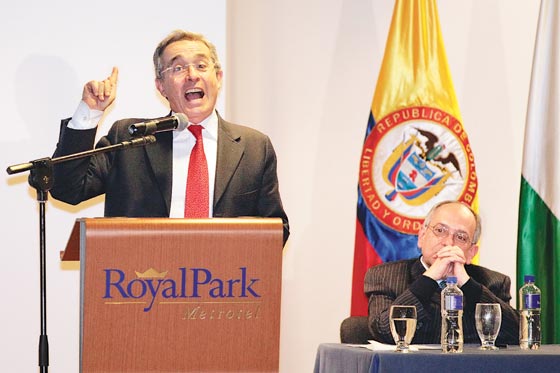2011-03-17 New evidence further incriminates the Government of Colombia in illegal wiretapping scandal
The Department of Administrative Security (DAS) of Colombia was used as a tool for domestic spying on various occasions during the Government of Alvaro Uribe (2002-2010). For example, #09BOGOTA849 states that, “CTI investigators reportedly found evidence that since 2004, the DAS had a unit dedicated to spying on groups and individuals considered a threat to the GOC. Originally known as the "G-3" group, the unit did not officially exist and reported only to the DAS director or the deputies in charge of intelligence and counterintelligence. "Semana" reported that besides numerous leftist groups and politicians, the G-3 also collected information on Supreme and Constitutional Court magistrates, Colombian Army officials, and their relatives. The unit was disbanded in late 2005 after a similar domestic spying scandal, but the article claims DAS continued domestic spying through the "National and International Group for Observation and Verification" (GONI) set up in 2006.”
The biggest scandal came in 2009 after weekly publication Semana broke the news that DAS had spied on Supreme Court Auxiliary Magistrate Ivan Velazquez and other leading magistrates that were working on a case investigating links between top level officials of GOC and paramilitary leaders. According to #09BOGOTA688, Semana stated that Velazquez “was followed by DAS detectives and may have had as many as 1900 of his calls illegally tapped over two years”. This quickly led to accusations by the Court that the Government of Colombia was trying to cover up its high level connections to right wing terrorist organizations. The Government denied its involvement in the scheme and was then placed under serious pressure to control DAS, to which Ex-President Uribe complied by placing them under the jurisdiction of the Colombian National Police (CNP) as well as by creating an investigative commission that vowed to identify the culprits.

However, in the same cable Ambassador Brownfield states that high level Government members were behind the plot:“XXXXXXXXXXXX told us that former DAS subdirector Jose Manuel Narvaez--a "paramilitary advisor" who left DAS in 2005 after a previous scandal--had retained access to the agency after his departure and was the Casa de Narino's main liaison with DAS. XXXXXXXXXXXX alleged that Narvaez's Casa de Narino contact was probably Gaviria or Secretary of the Presidency Bernardo Moreno”
This version is strengthened by #09BOGOTA849:
“Local journalist Felix deBedout told us former DAS sub-director Jose Narvaez was behind the original domestic espionage operation and continued to control GONI after his departure from the DAS in 2005”.
Also, in cable #09BOGOTA3271:
“Though he had no proof, and at this time it was his mere conjecture, XXXXXXXXXXXX said he suspected Uribe's Secretary of the Presidency Bernardo Moreno and possibly advisor Jose Obdulio Gaviria had ordered the illegal surveillance. XXXXXXXXXXX said he would pursue the investigation wherever it leads”.
The veracity of the statement is confirmed by Brownfield himself in a comment at the end of the text, saying that, “this falls in the category of informed speculation, but speculation from XXXXXXXXXXXX has a pretty good track record for success”.
Bernardo Moreno was convicted and sentenced to an 18 year ban from public office. Jose Obdulio Gaviria and along with some other of Ex- President Uribe´s advisors are still being investigated by the Prosecutor General´s office.
Uribe´s role in the whole matter has never been determined clearly. Cable #09BOGOTA1618 , however, suggests that he might have had an active involvement in previous spying scandals. Andres Peñate, DAS chief from 2005 to 2007 is quoted as saying that “President Uribe never pressured him to report on the domestic opposition, but did encourage him to coordinate with Gaviria in 2006 when the GOC began to encounter political problems because of the reelection debate. Penate claimed he resigned from the DAS rather than deal with the pressure to use the DAS for domestic political purposes from Gaviria, Moreno, and other presidential advisors”.
Peñate also told U.S. officials that Uribe had made a mistake by opening up the DAS archive to the Prosecutor General´s office because now their investigative commission had access to ex DAS chief Jorge Noguera (2002 – 2005). He also says that these “toxic” files also confirm public reports that Narvaez ordered DAS to provide an armored car to former paramilitary leader Jorge 40 and passed "hit lists" to paramilitary forces. Other information now in the CTI's possession confirms the role of senior DAS official in Santa Marta in the 2004 murder of Alfredo Correa de Andreis, a union official and professor in Barranquilla”.
Peñate incriminates the Colombian government and Uribe even further by saying that “the slowness of the Fiscalia's prosecution of Noguera to GOC pressure on Iguaran not to proceed. Penate believes the pressure reflects the fact that Noguera provided political intelligence to the GOC during the first reelection effort, including intercepts of two Constitutional Court magistrates”